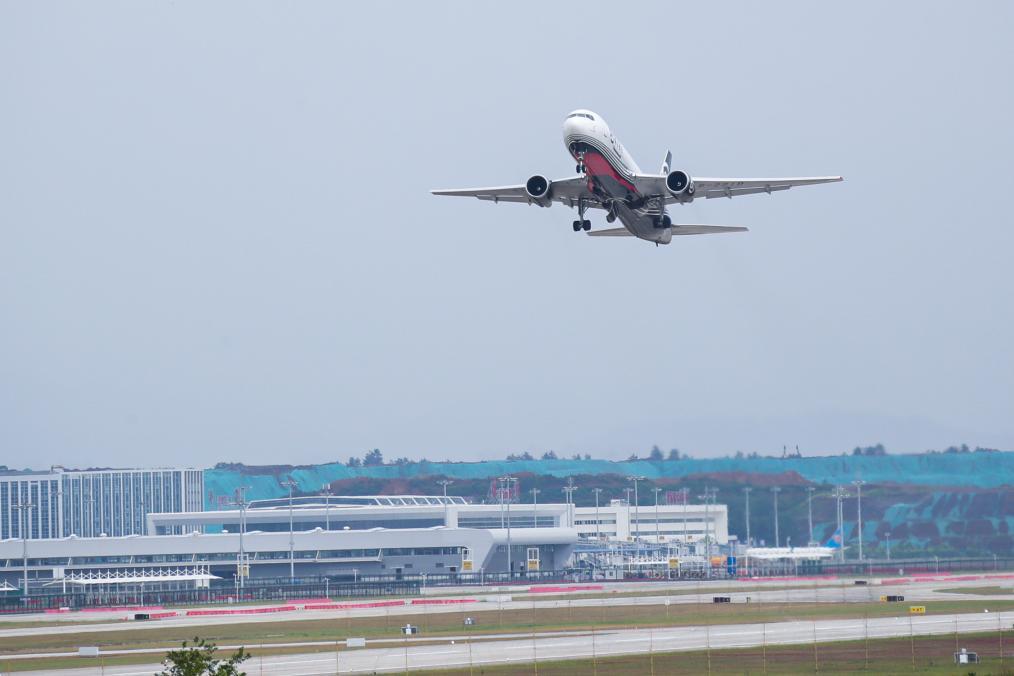China's air cargo industry highlights resilience, dynamics
 0 Comment(s)
0 Comment(s) Print
Print E-mail Xinhua, October 25, 2023
E-mail Xinhua, October 25, 2023

A cargo plane flies over the Ezhou Huahu Airport in Ezhou, central China's Hubei Province, July 17, 2022. [Photo/Xinhua]
China's air cargo industry has been making constant progress and unleashing potential for industry players at home and abroad.
Airlines, airports, and other players in the industry are making intensive moves by expanding freighter fleets, launching new routes, adding infrastructure, enhancing operation efficiency, and more.
SF Airlines, China's largest cargo airline in terms of fleet size, has taken a major step toward its target to become a world-class large-scale cargo carrier by expanding its fleet to 86 freighters.
The freighter fleet and air-route network will boost air-express delivery efficiency in the upcoming Double 11 shopping spree and other logistics peaks.
Headquartered in south China's Shenzhen, SF Airlines is the aviation branch of China's leading courier enterprise, SF Express. The fleet enables the company to expand its air-route network and speed up the delivery of goods with time-sensitive requirements.
The air cargo sector plays an important role in stabilizing the industrial and supply chains.
China's civil air transport industry maintained a good momentum of recovery. In August, its transport turnover was 11.61 billion tonne-kilometers, an 87.4 percent year-on-year increase, marking the scale of China's air transport has exceeded the level of 2019 for two consecutive months, according to the Civil Aviation Administration of China (CAAC).
The industry handled 636,000 tonnes of air cargo this August, up 1.1 percent from August 2019, according to statistics from the CAAC.
Major industry players at home and abroad are generating power from the dynamic air cargo sector sustained by recovering air transport.
The throughput of the Ezhou Huahu Airport exceeded 100,000 tonnes in mid-October. It marked a major step forward for the airport, which has been increasing air routes and adding new infrastructures, said the airport.
Starting operation in July 2022, the Ezhou Huahu Airport is China's first cargo-focused airport. Targeting to become a world-class air cargo hub, the airport will constantly enhance its cargo-handling capacity and operation efficiency, the airport added.
"China's economy has been on track for a steady recovery, broadening the space for the air cargo business," said Eddy Chan, FedEx senior vice president and president of FedEx China.
According to Chan, the company is expanding its air-cargo network, upgrading services with digital techs, and injecting green facilities and vehicles into the Chinese market. Also, it is joining efforts with local partners to upgrade infrastructures, build air cargo hubs, and more.
FedEx now operates more than 300 international air-cargo flights per week in China and provides express delivery services via its Asia-Pacific Hub in Guangzhou, International Express-and-Cargo Hub in Shanghai, and its four gateway operation centers across China.
"Getting chances from growing China's air cargo sector, we will continue to sustain the high-quality and sustainable growth here by enhancing services, strengthening the network, and facilitating green transformation," said Chan.





